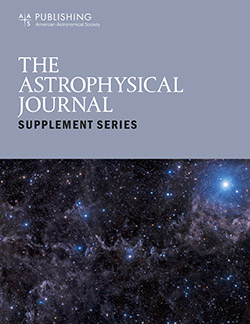模拟钱德拉x射线观测对恒星点源的灵敏度
IF 8.6
1区 物理与天体物理
Q1 ASTRONOMY & ASTROPHYSICS
引用次数: 8
摘要
钱德拉天鹅座OB2遗产巡天是对邻近的大质量天鹅座OB2星系进行的广泛而深入的x射线巡天。该调查已经探测到约8000个x射线源,其中大多数是主序前x射线发射的年轻恒星。为了便于对这些来源以及潜在OB关联进行定量科学研究,了解观测结果的敏感性和观测结果的完整性水平是很重要的。在这里,我们描述了分层蒙特卡罗模拟的使用,通过结合观测的经验特性、源验证过程的分析估计和一组广泛的源检测模拟来实现这一目标。我们发现,在天鹅座OB2的距离上,在x射线亮度为4 × 10 30 erg s−1,随机分布的恒星质量为1.3 M⊙的前主序星群,我们的调查达到了90%的完整性水平。对于空间聚集的种群,如Cyg OB2, 90%的完整性水平达到1.1 M⊙,因为源更集中在我们调查的高暴露区域。这些模拟可以很容易地适用于其他x射线观测和调查,我们为非常广泛的源和背景属性提供x射线探测效率曲线,使这些模拟可以很容易地被其他用户利用。本文章由计算机程序翻译,如有差异,请以英文原文为准。
Simulating the Sensitivity to Stellar Point Sources of Chandra X-Ray Observations
Abstract The Chandra Cygnus OB2 Legacy Survey is a wide and deep X-ray survey of the nearby and massive Cygnus OB2 association. The survey has detected ∼8000 X-ray sources, the majority of which are pre-main-sequence X-ray-emitting young stars in the association itself. To facilitate quantitative scientific studies of these sources, as well as the underlying OB association, it is important to understand the sensitivity of the observations and the level of completeness the observations have obtained. Here we describe the use of a hierarchical Monte Carlo simulation to achieve this goal by combining the empirical properties of the observations, analytic estimates of the source verification process, and an extensive set of source detection simulations. We find that our survey reaches a 90% completeness level for a pre-main-sequence population at the distance of Cyg OB2 at an X-ray luminosity of 4 × 10 30 erg s −1 and a stellar mass of 1.3 M ⊙ for a randomly distributed population. For a spatially clustered population such as Cyg OB2 the 90% completeness level is reached at 1.1 M ⊙ instead, as the sources are more concentrated in areas of our survey with a high exposure. These simulations can easily be adapted for use with other X-ray observations and surveys, and we provide X-ray detection efficiency curves for a very wide array of source and background properties to allow these simulations to be easily exploited by other users.
求助全文
通过发布文献求助,成功后即可免费获取论文全文。
去求助
来源期刊

Astrophysical Journal Supplement Series
地学天文-天文与天体物理
CiteScore
14.50
自引率
5.70%
发文量
264
审稿时长
2 months
期刊介绍:
The Astrophysical Journal Supplement (ApJS) serves as an open-access journal that publishes significant articles featuring extensive data or calculations in the field of astrophysics. It also facilitates Special Issues, presenting thematically related papers simultaneously in a single volume.
 求助内容:
求助内容: 应助结果提醒方式:
应助结果提醒方式:


